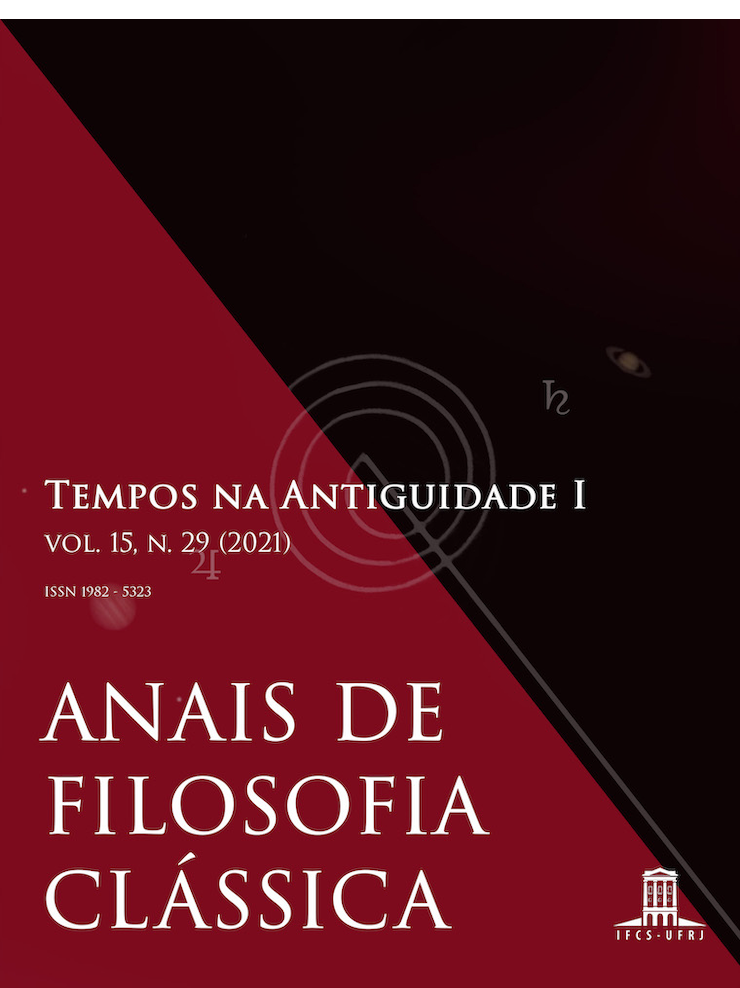The mythical ontology in the Form of Good
DOI:
https://doi.org/10.47661/afcl.v15i29.41998Keywords:
Form of Good, Dialectic, Rational Soul, Ontology, Epistemology, MythAbstract
In this paper I Intend to analyze how the presumed socratic incapacity (adynamía) to define what is Good reveals the main role of visibility as pre-condition to comprehend the Form of Good, but a necessary step to this. According to this assumption, the phenomenal realm isn’t an obstacle to achieve the Forms. My purpose here is to emphasize that the so-called adynamía turns into a specific kind of dynamís tês aisthéseos, power of sensation, by which the dialectician can apprehend the realm of in telligibility. In the first section, I’ll expose that the images of Sun, Divided Line and the Cave establish a semantic of visibility, detailed from the closer analogy between the ontological field of being, intermediate and not-being and the epistemological scope of knowledge, opinion and ignorance. In the second section I’ll demonstrate the relevance of dialectic science in order to seize the ontological degrees of reality and its epistemological paths of knowledge.References
BERNABÉ, Alberto. Platão e o Orfismo, Diálogos entre Religião e Filosofia. São Paulo: Annablume Clássica, 2011.
BRISSON, Luc. “Mythes, Écriture, Philosophie”. In MATTÉI, Jean François (Org.). La Naissance de la Raison en Grèce. Paris: PUF, 1990.
CHERNISS, Harold. “L’économie philosophique de la théorie des idées”. Traduit par J.F. Pradeau IN. PRADEAU, Jean-François (Org.). Platon: les formes intelligibles. Paris: PUF, 2004.
COLLI, Giorgio. La Sagesse Grecque. Tome III. Héraclite. Trad. Marie José Tramuta. Paris: Editions l’Éclat, 1994.
CORDERO, Néstor-Luis. “La participation comme être de la forme dans le Sophiste de Platon”. In Ontologie et Dialogue, Mélanges en Hommage à Pierre Aubenque. Paris: Jean Vrin, 2000.
DIXSAUT, Monique. Platon et la Question de la Pensée. Paris: Jean Vrin, 2000.
DIXSAUT, Monique. Platon. Le Désir de Comprendre. Paris: Jean Vrin, 2003.
GADAMER, Hans George. L’idée du Bien comme Enjeu platonico-aristotélicien. Paris: Jean Vrin, 1994.
GUTHRIE, W.K.C. The Sophists. Cambridge: CUP, 1971.
KAHN, Charles H. “La philosophie de Socrate selon Platon et Aristote” In. DHERBEY, Gilbert Romeyer (Org.). Socrate et les socratiques. Paris: Jean Vrin, 2001.
LAFRANCE, Yvon. “La rationalité platonicienne: mathématiques et dialectique chez Platon” IN. NARCY, Michel (Org.). Platon: l’amour du savoir. Paris: PUF, 2001.
MATTÉI, Jean François. Platon et le miroir du mythe. De l’âge d’or à l’Atlantide. Paris: PUF, 1996.
NIGHTINGALE, Andreas Wilson. Spectacles of truth in classical greek philosophy, theoria in its cultural context. Cambridge: C.U.P., 2009.
PLATON. La République IV-VII. Texte établi et traduit par Émile Chambry. Paris: Les Belles Lettres, 1989.
PLATON. Phèdre. Texte établi et traduit par Léon Robin. Paris: Les Belles Lettres, 1954.
PLATON. Sophiste. Texte établi et traduit par Auguste Diès. Paris: Les Belles Lettres, 2003.
XXXXX. “A bela ordem incorpórea no Filebo de Platão” IN TRANS/FORM/AÇÃO, v. 32, n. 2, págs. 3-30, 2012.
ROBINSON, Richard. Plato’s earlier dialectic. Oxford: Oxford University Press, 1962.
TORRANO, JAA. Mito e imagens míticas. São Paulo: Editora Córrego, 2019.
VASILIU, Anca. Images de Soi dans l’Antiquité tardive. Paris: Jean Vrin, 2012.


